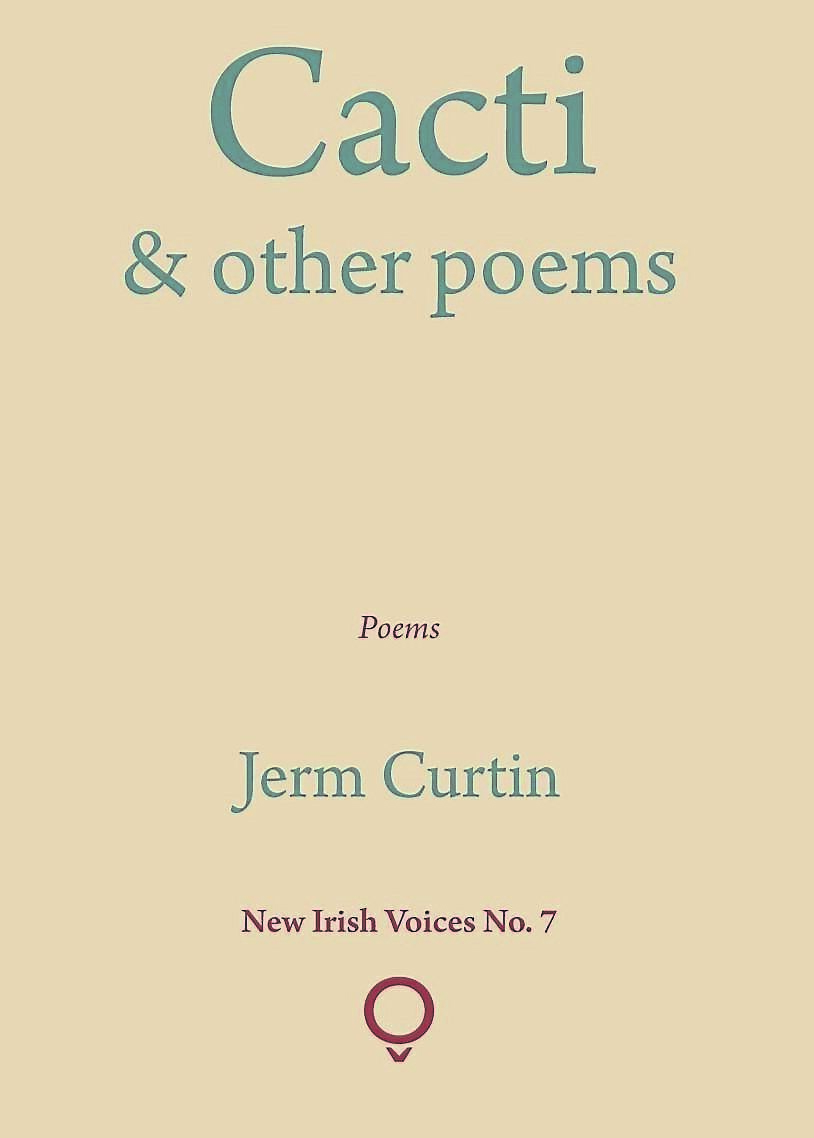Cork poet on new book: 'In a good poem you receive more than information...a moment comes alive'

Jerm Curtin, author of the new book of poems, Cacti & Other Poems.
In the opening poem in my chapbook, Cacti & Other Poems, the boy-poet explores his grandmother’s house while she is tending to her potted plants.
He becomes so absorbed in his discoveries in dusty corners that he loses all sense of time passing.
In later life, he remembers this as an early lesson in the power of poetry to make us feel more at home in our lived experience and engrossed in it.
Cacti & Other Poems is the seventh in the New Irish Voices series published by Southword Editions, run by Munster Literature Centre in Cork.
I grew up near Boherbue in north-west Cork. If you only know that area passing through on your way to Tralee, all you would have noticed were the acres of grassland and the feeding cattle.
We move so quickly through places, in fast cars or glued to our phones, in a state of such distraction, that we often make do with superficial impressions.
Driving through, you would not guess that my native place lies on the eastern borders of the ancient badlands of Sliabh Luachra, home to outlaws and renegades, wandering fiddlers and poets.
Here, in the village of Knocknagree, one of our greatest poets, Eoghan Rua, came to his tragic end. If you know such things, your perspective on a place deepens and your encounter with it is richer.
It is such knowledge that we gain from reading poetry. In a good poem, you receive more than information. You get to feel, see, and hear what the poet experiences. A moment comes alive in full colour, its background, its history, vividly before you.
In my poem, In Memory Of A Neighbour, I follow the echoes of the recent covid pandemic back towards the tragedy of the famine. I like to think that poetry helps us to memorialise our losses.

I was not in Ireland during lockdown, and that poem grew from the descriptions of that time in my father’s words over the phone.
He was a carpenter by trade, and from him I learned that the best objects are those fashioned with skill, care and attention to detail. When he speaks about his trade, he sounds like a poet referring to their technique.
My mother was a national school teacher who lovingly recited 19th century ballads and old poems in Irish as she worked around the house. I must have come to associate the rhythms of spoken poetry with a sense of wellbeing and contentment because, as a teenager, I began writing it myself.
In another poem, First Light, I celebrate the role of women like my mother in bringing joy to the lives of those around them.
Soon, as they say, poetry became a habit. As a young man, I read the writers in vogue at that time, those from New York and Northern Ireland, Seamus Heaney and Derek Mahon, John Ashbery and Frank O’Hara.
When I moved to Cork city, I discovered that something of the spirit of both places had been brought here by John Montague and an exciting generation of local poets was coming into its own, Thomas McCarthy and Sean Dunne, Theo Dorgan, Greg Delanty, and Patrick Cotter.
However, I didn’t settle in Cork. In another poem, By Harsh Grass, I tried to capture the impulse to move on, to bring about change in oneself, in others, often regardless of the consequences. I left Ireland in the mid-1980s on such an impulse and by chance ended up in Spain, where I have lived since.
I live in Badajoz, a city on the Portuguese border in the southern region of Extremadura, though my Spanish ties are closest to the area of Galicia in the North-West, where my partner is from.
Obviously, having been here for so long, some of my poems deal with Spanish themes, though the stereotypes of sangria and crowded beaches, Flamenco and bullfights, make no appearance. In The Sun Visits The Old Quarter, I tried to evoke a humble semi-urban neighbourhood in a provincial Spanish city where life is lived at an agreeably human pace.
The tragedies of Spanish history find their way into the poem Lola Wakes. In August, 1936, after the fall of the city of Badajoz, 4,000 people, mostly civilians, were rounded up and executed under the orders of Fascist generals.
The tragedy of the Civil War still divides Spanish society. There are those who believe such crimes should be remembered. However, the voices of right-wing apologists who defend the perpetrators have become louder in the worldwide climate of regressive politics led by Donald Trump in the US.
Although I live in Spain, I hope my poems retain their Irishness. I am glad they are coming into the world in Cork. My formation owes everything to our native cannon.
From the classics collected in An Duanaire to Yeats and Kavanagh, from Old Irish poems translated so beautifully by Frank O’Connor, to modern poets like Eiléan Ní Chuilleanáin and Martina Evans, it is a rich and vibrant tradition.
My poem, A Station In A Market Town, is set in one of those bus stations built with EU subsidies to service rural towns.
These places are essential points of transit for people with limited means, but I have tried to articulate the sense of loss that comes when you are no longer in touch with the place you come from.
I write a lot about people who find themselves living under the effects of history, though they couldn’t be described as victims.
In the final poem in my latest book, a character narrates how an older relative survived a Nazi concentration camp. I tried to capture both her fascination with his experience and to show how, despite ourselves, the past weighs on us and determines how we view the future.
I cannot agree with those who argue that we should turn away from our past. Remembering is how to best avoid repeating the errors of those who came before us.
Cacti & Other Poems, by Jerm Curtin, is published by Southword Editions, €8. More information at munsterlit.ie/bookshop







 App?
App?


